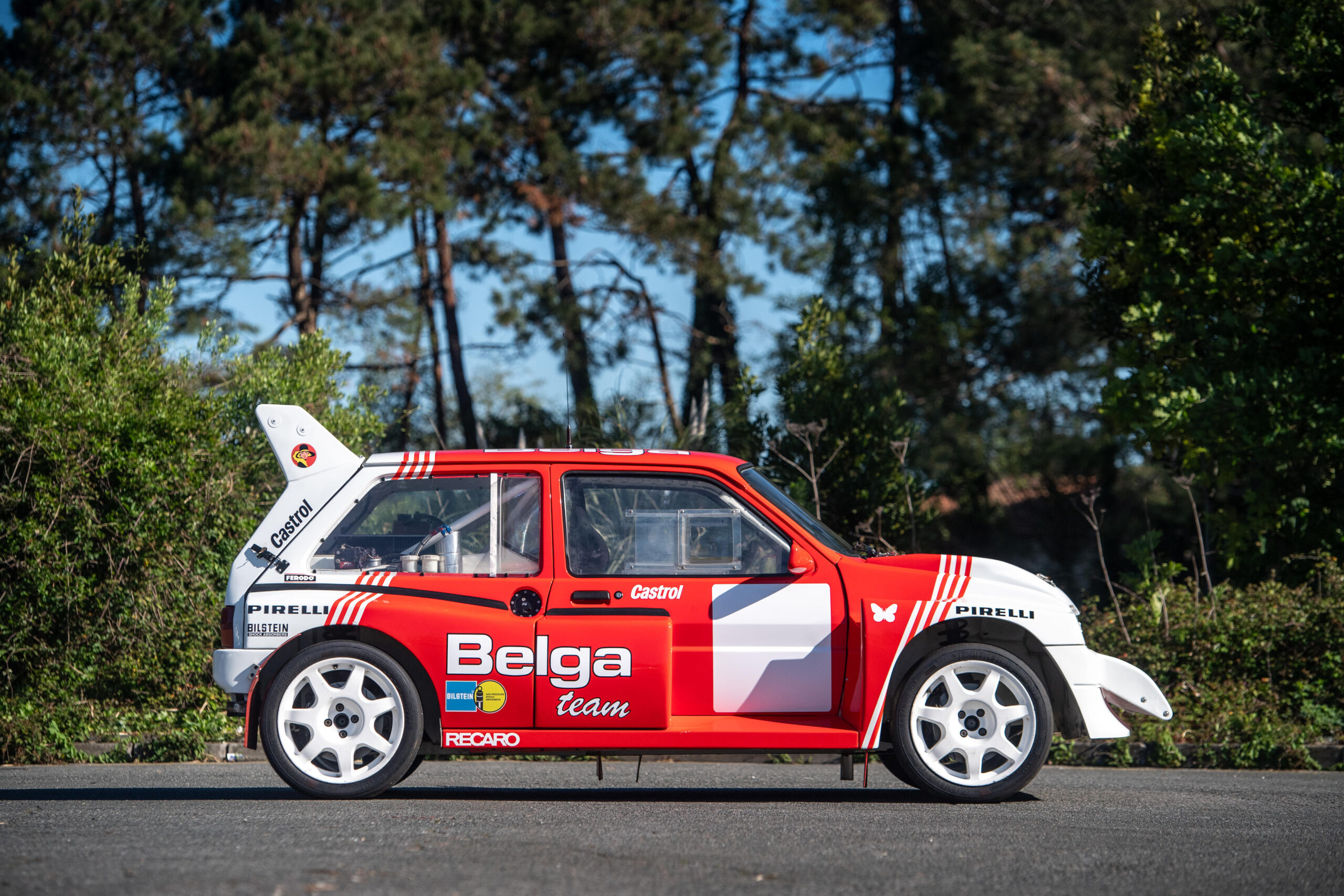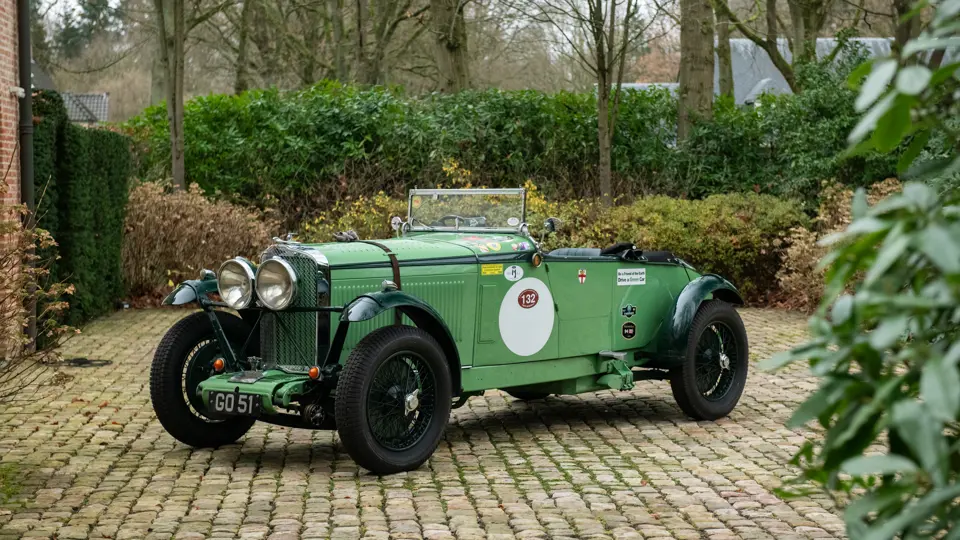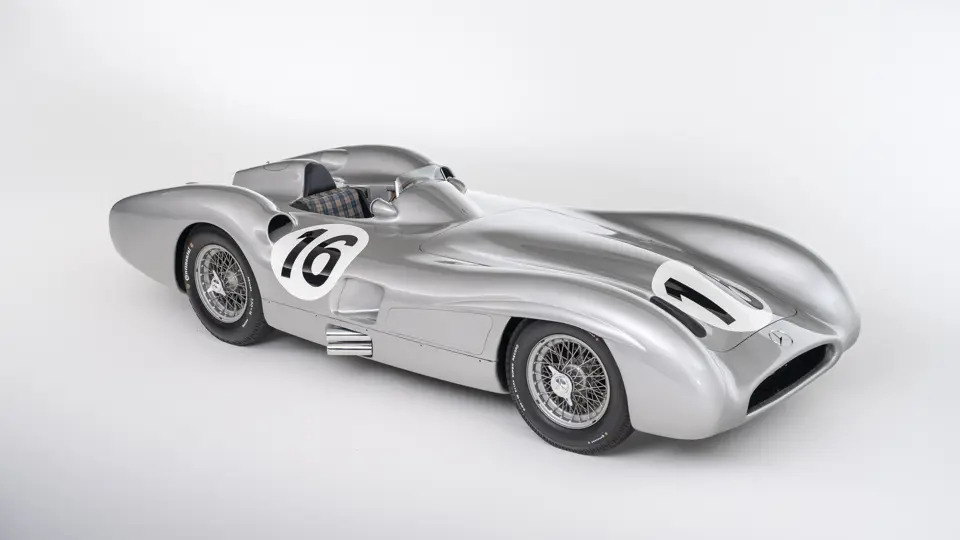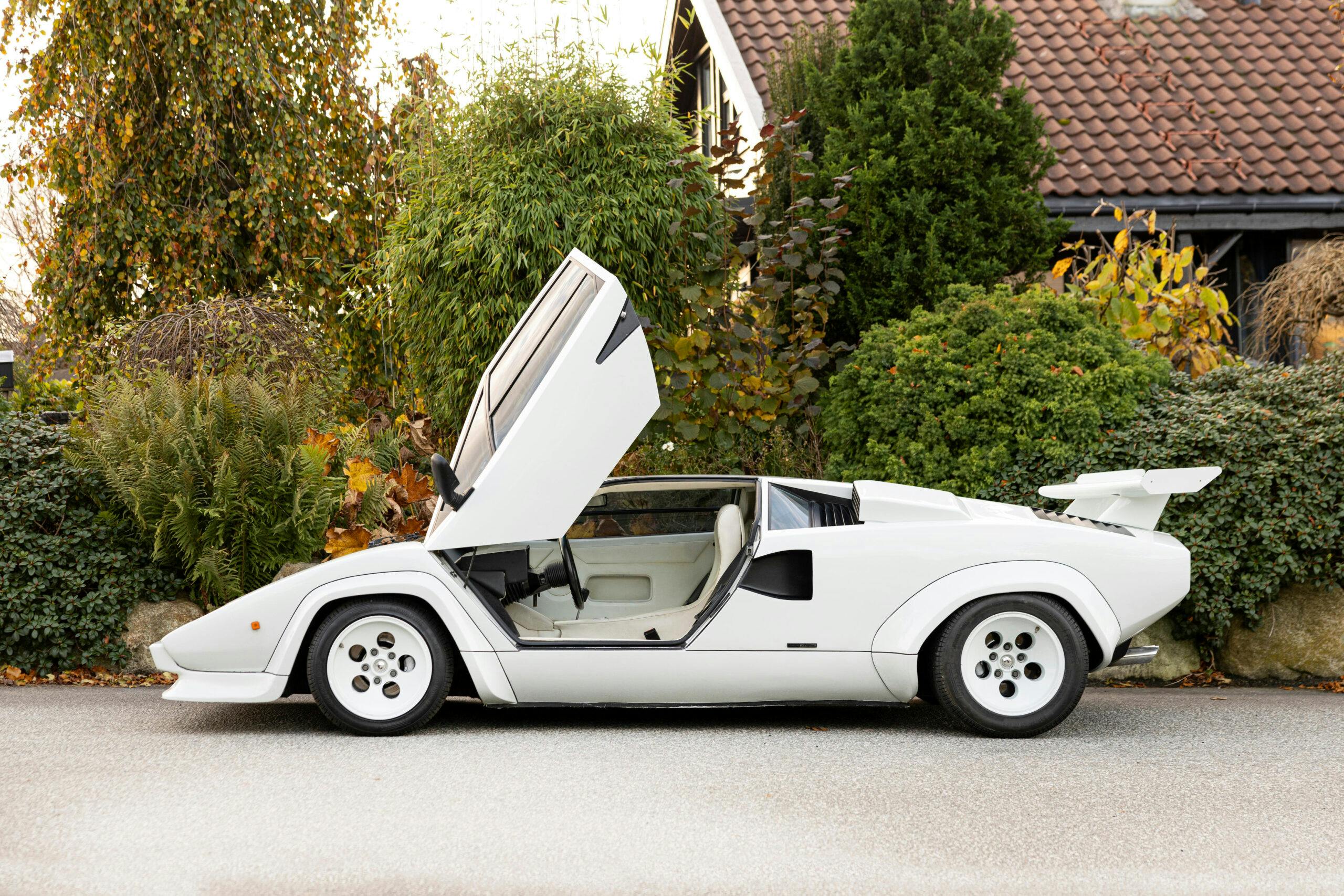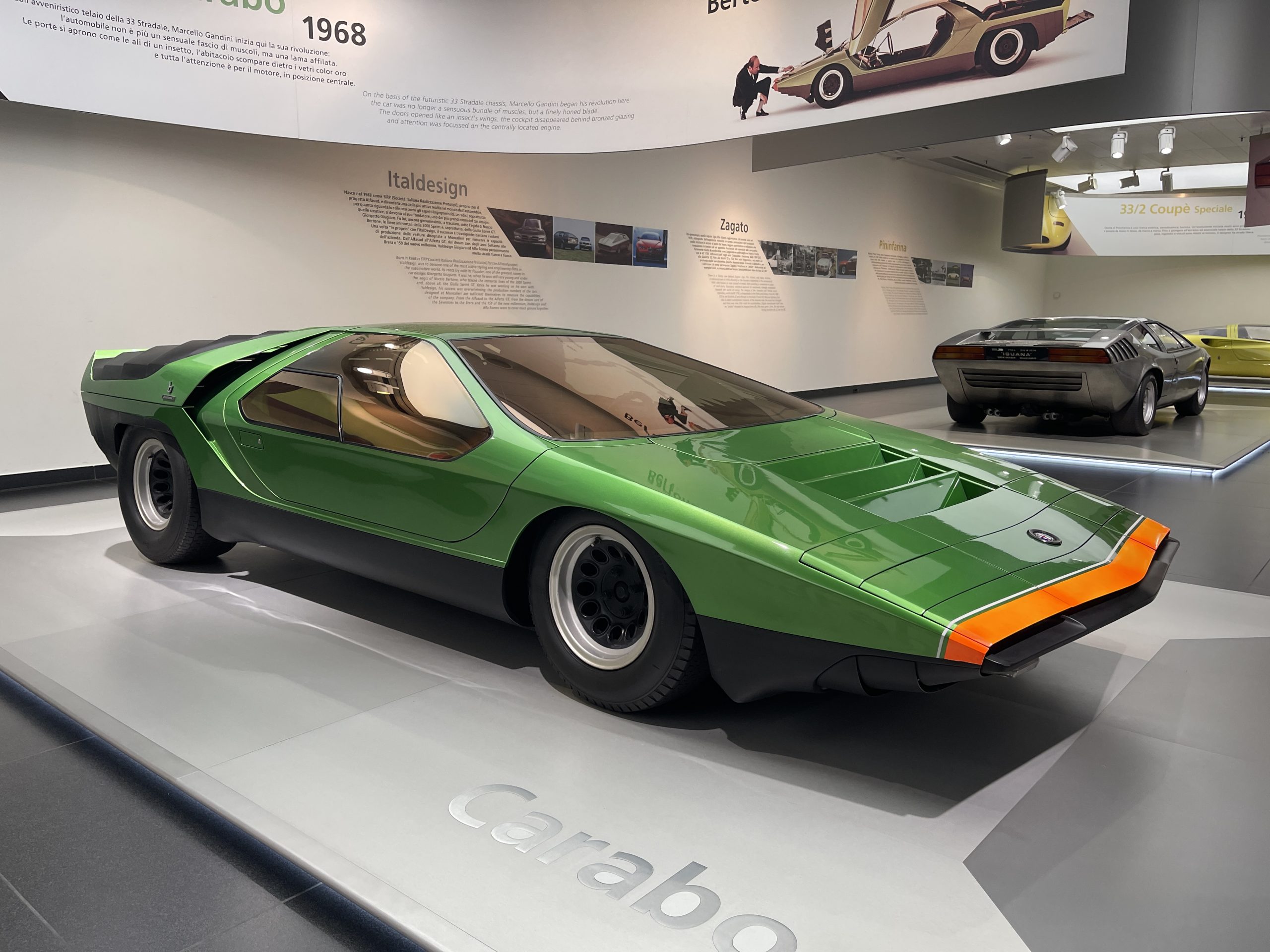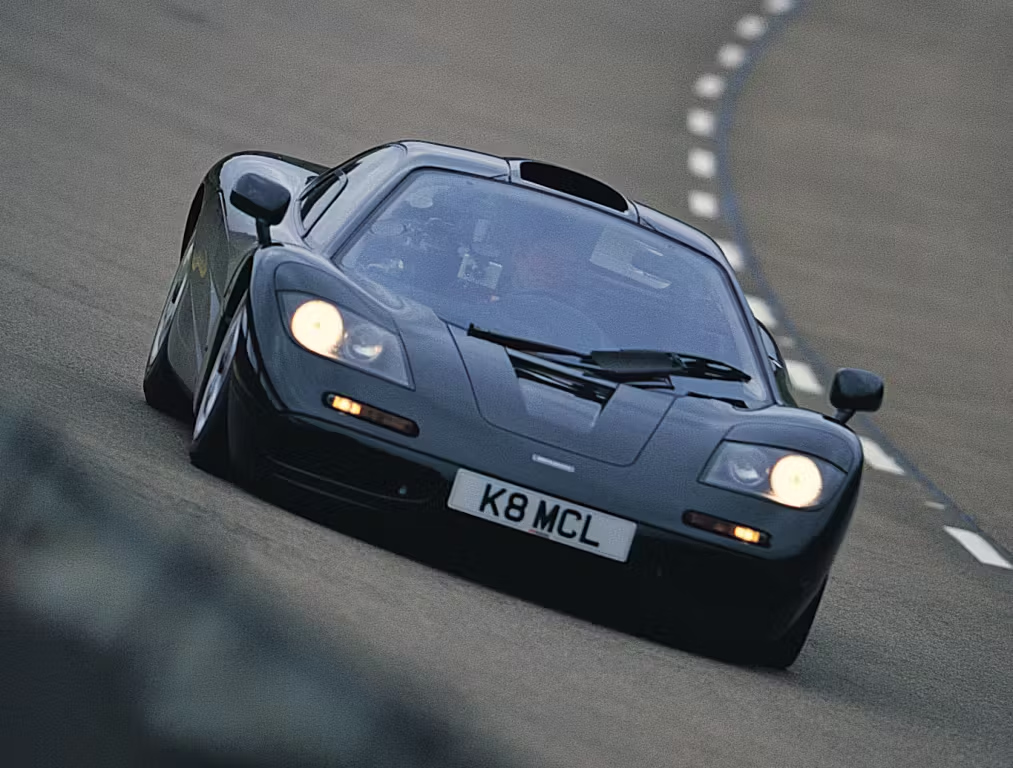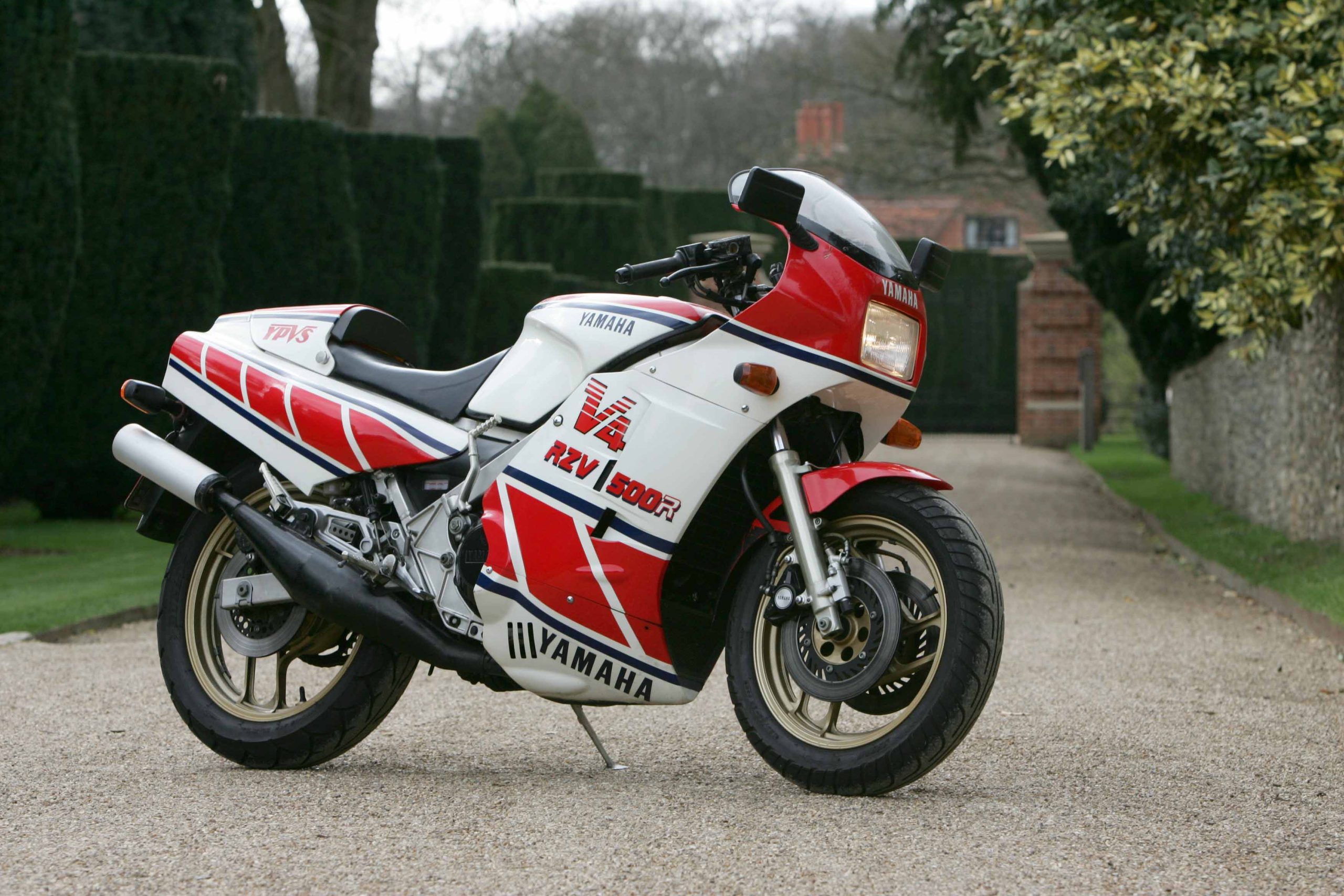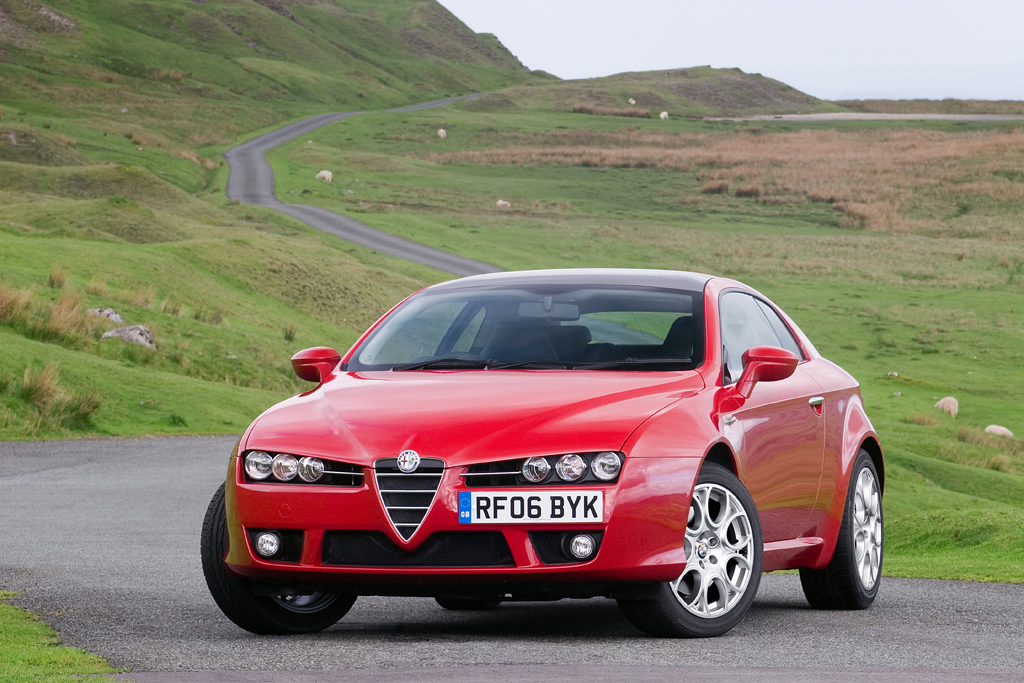Each year during the Goodwood Festival of Speed, Bonhams brings together a few dozen sports, racing, and other classic cars to be sold at auction. The sale has seen mixed results over the past few years, and 2024 did as well. Of the 74 lots offered, just 44 were reported sold. Despite that, there were a few exceptional, above-estimate results. We look at the cars that caught our attention in detail below. Our colleague Chris Sharpe was on-site at Goodwood to look over the cars in detail, and provided valuable notes as to the condition of each vehicle.
Lot 244: 1969 Aston Martin DB6 Mk I Volante
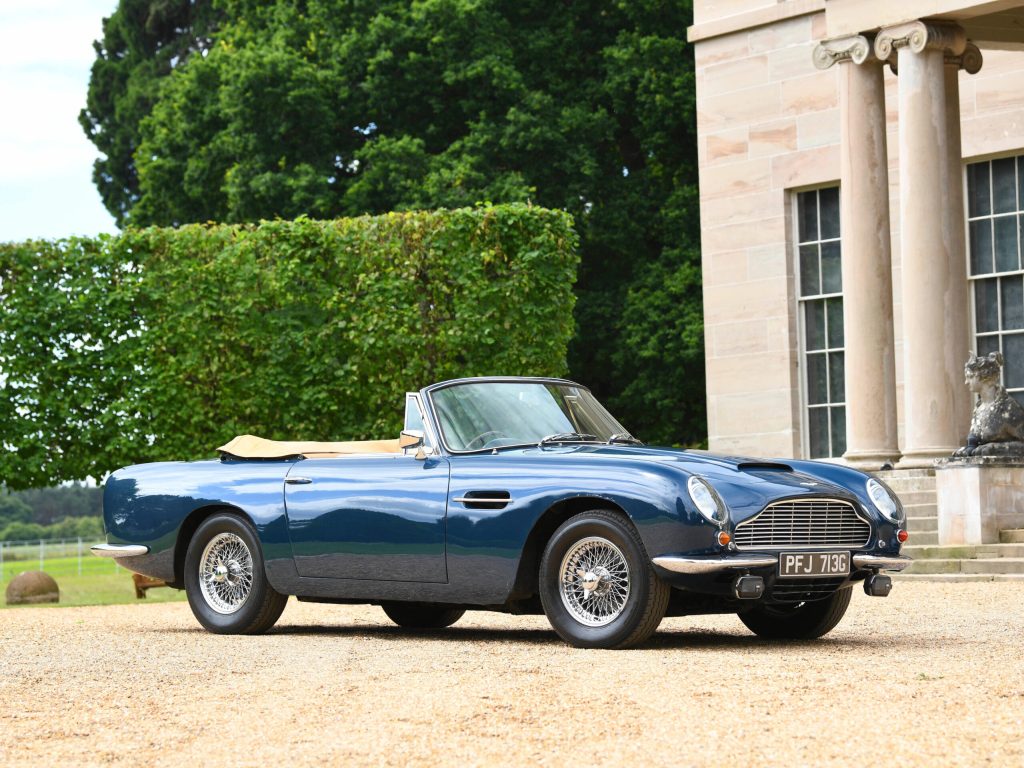
Sold for £448,500

Chassis no. DBVC3736R; Engine no. 4004171. Dawn Blue with blue cloth top over cream leather. Visually maintained, largely original, #3- condition.
Equipment: RHD. 3995cc/282bhp inline-6, 5-speed ZF gearbox, chrome wire wheels, power windows, wood-rim steering wheel, Smiths dash clock, push-button radio, boot cover.
Condition: Represented as one of only 140 long-wheelbase Mk 1 DB6 Volantes (Aston-speak for “convertible”). In previous ownership for 30 years and maintained by marque specialists RS Williams from 2003 to 2015. The original matching-numbers engine was rebuilt, and the original automatic transmission was swapped for a ZF five-speed in 2007, 3000 miles ago. The last major service was in 2021, and new fuel tanks fitted in 2022. Cosmetically, however, it looks due for a refurb because of poor-quality paintwork with blisters and cracks everywhere from what looks like less-than-ideal storage conditions. Although the seats have reportedly been changed from grey to cream, the driver’s seat is very worn and the boot cover is creased and dried. A bit unloved for such a pretty car.
Bottom line: Although this car doesn’t have the top-spec Vantage engine, convertible Astons of this era are exceedingly rare and exist at an entirely different price point than their hardtop stablemates. An excellent-condition Volante that ticks all the right boxes could be knocking at the door of £650K. This car, however, is a long way off from perfect as the condition, unclear early history, colour changes and gearbox change did it no favours. Bonhams gave it a realistic £380,000 –£450,000 estimate, though, and it sold right within that range for a rational result.
Lot 257: 2008 Mercedes-Benz SLR McLaren ‘Crown Edition’
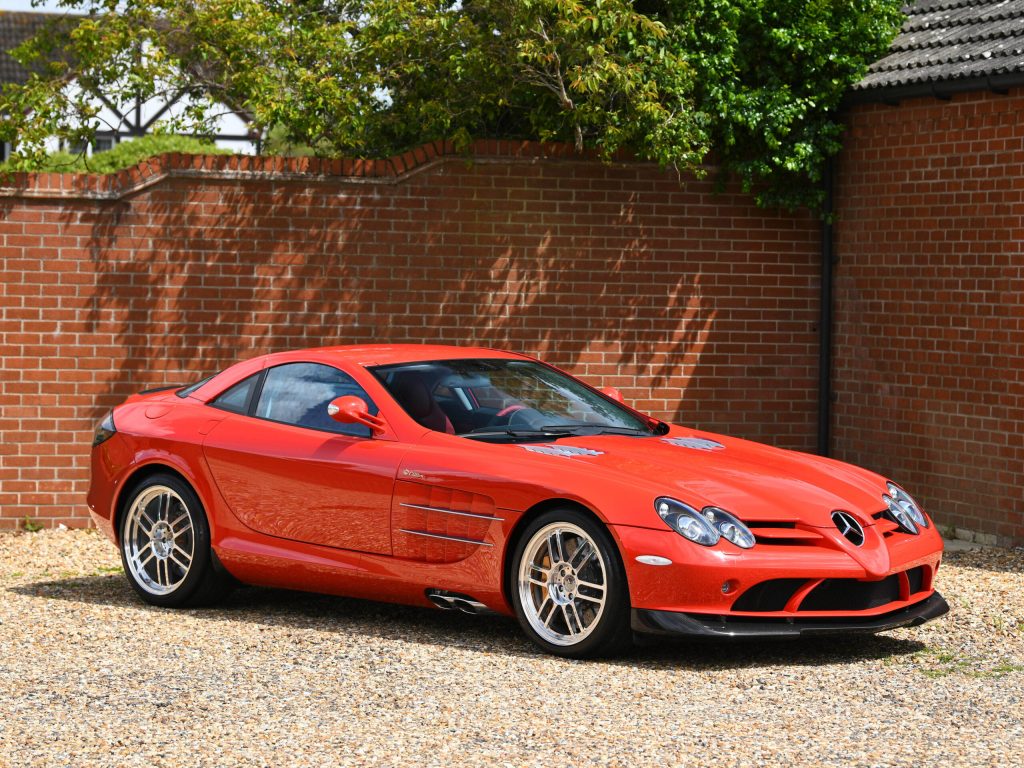
Sold for £563,500
Chassis no. WDD1993761M001679. Red over red leather. Original, #2+ condition.
Equipment: LHD. 5439cc/641bhp V8, AMG SPEEDSHIFT R five-speed automatic, active aerodynamics, 19-inch alloy wheels.
Condition: One of 10 “Crown Edition” SLRs produced. Built to Swiss specification with special features from the 722 Edition model, including engine, suspension, and aerodynamic upgrades. Represented with 60km (37 miles) from new on the odometer and always dry-stored, but it would need recommissioning to actually drive it. It has all perfect surfaces, and the interior still smells like a new 2008 Mercedes. Sold straight from storage and from outside the UK, so there would be additional shipping, duty, and tax considerations for a British buyer.
Bottom line: The McLaren/Mercedes collab of the 2000s produced an extremely handsome, competent, and fast grand tourer that on speed, power, and price competed with the Porsche Carrera GT and Ferrari Enzo hypercars. As collector cars, though, SLR values haven’t done much compared to the now-seven-figure Porsche and Ferrari. Only special variants like the high-performance 722 Edition or speedster-bodied Stirling Moss model bring serious money, and this 1-of-10 “Crown Edition” had the additional benefit of being a low-mileage single-owner example, even if red just doesn’t feel like the right colour on this car. It found the right audience in Goodwood, however, because it blew past its £200,000 –£300,000 estimate and well over the €506,000 achieved by another single-owner Crown Edition with 72km sold only a couple of months ago.
Lot 212: 1971 Fiat Dino 2400 Spider
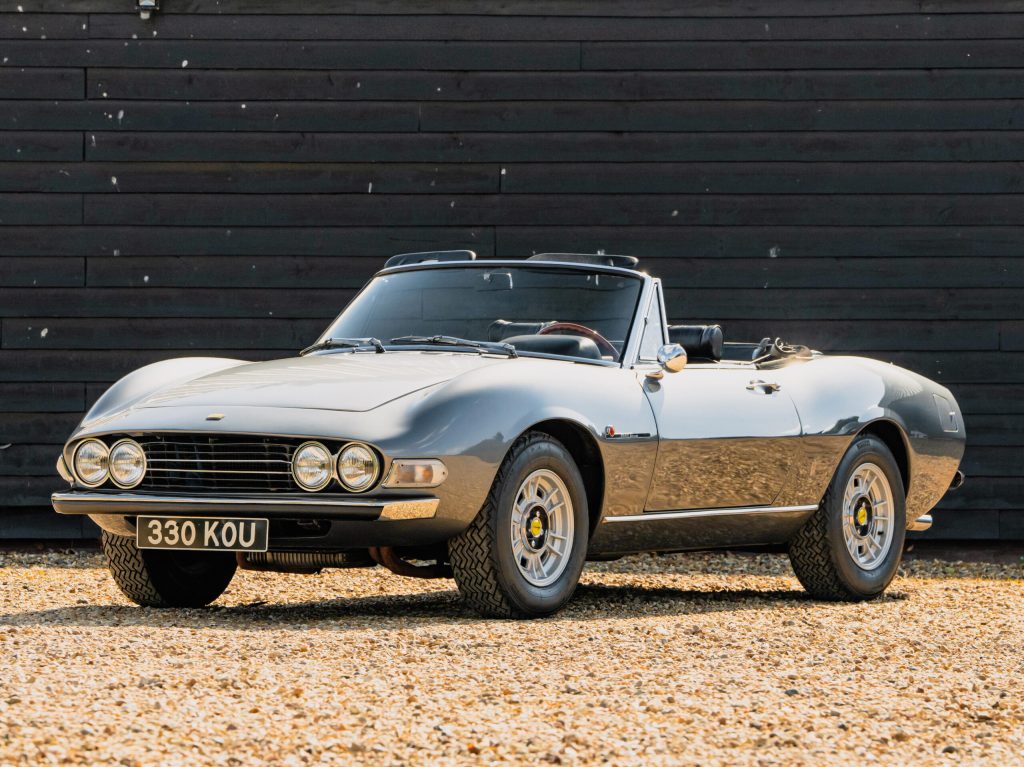
Sold for £132,250
Chassis no. 135BS0001386. Gunmetal Grey over black leather. Visually maintained, largely original, #3+ condition.
Equipment: LHD. 2418cc/180bhp V6, ZF five-speed, alloy wheels, power windows, wood-rim steering wheel, cassette player.
Condition: One of 424 examples of the Pininfarina-bodied Fiat Dino Spider. Known ownership history from new. Imported into the UK in 1978 and represented with two owners for the last 46 years, the last one since 2003. Comes with Italian documentation and invoices. Good paint and acceptable trim. Good leather on seats that are sagging a little – new foam would help. Has received significant attention when necessary but doesn’t look to have ever been restored. An enjoyable summer car.
Bottom line: An early collaboration between Fiat and Ferrari, the Fiat Dino was beneficial to both companies. Ferrari wanted to homologate its Dino V6 engine for F2 racing but didn’t quite have the production capacity to build the 500 Dino-powered road cars required. Fiat did, however, and having a Ferrari-powered model added prestige to its lineup. Bertone styled a handsome but conservative 2+2 coupe on the platform, while Pininfarina penned a much wilder Spider version. The Spiders are rarer and more valuable, although for many years either Fiat Dino was one of the best ways to get Ferrari power on a budget. That’s no longer the case for the Spiders at least, and all but the scruffiest examples are six-figure cars. This one sold well considering its mild but noticeable wear and tear.
Lot 208: 2008 Force India-Ferrari VJM01
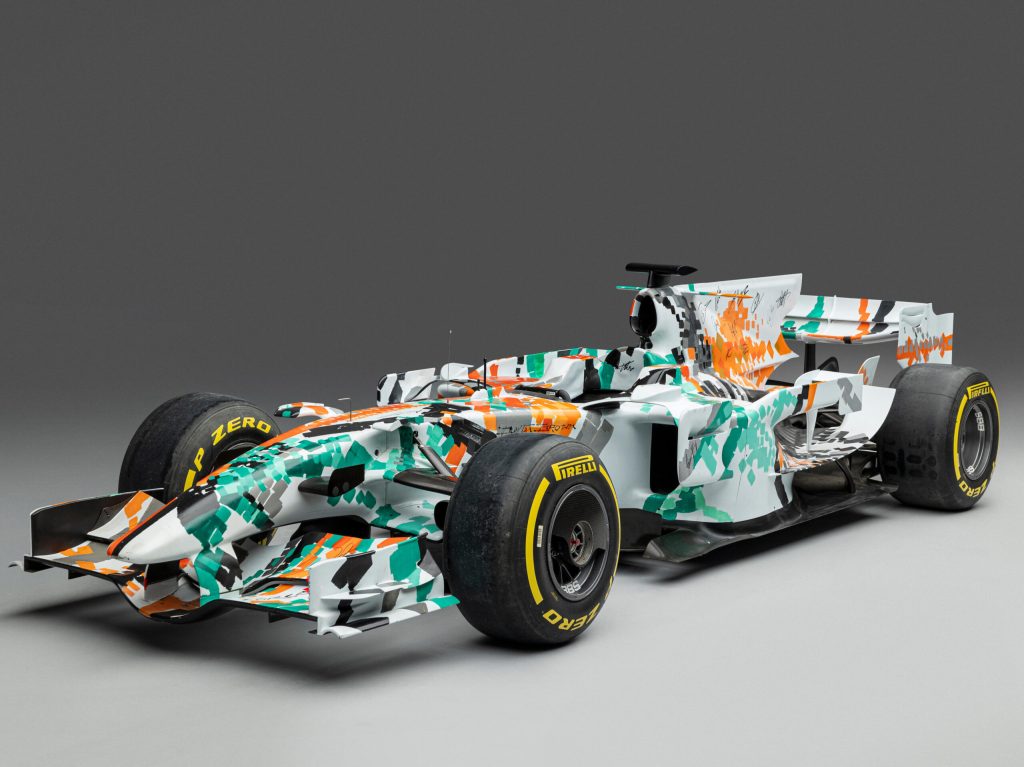
Sold for £80,500
Chassis no. VJM0105. Competition car, original as-raced, #3+ condition.
Equipment: No engine or transmission but full original steering wheel, seat, and harnesses.
Condition: Driven in 16 World Championship Grands Prix by Giancarlo Fisichella and completed over 4200 miles of testing with Fisichella as well as Vitantonio Liuzzi and Adrian Sutil. Force India finished 10th in the Constructors’ Championship that year, and Fisichella finished 19th in the Drivers’ standings. The car was later given the “art car” treatment by artist Dexter Brown. Sold for charity in 2011 and subsequently retained by the team. Offered in show-car configuration. Its gearbox and Ferrari 2.4-litre V8 are gone, and the way the paint is applied makes it hard to see the actual shape of the car.
Bottom line: Modern F1 cars are extremely complex, computer-heavy things. They are difficult and expensive to make run and drive, and they are so fast that most collectors could never enjoy them on track to their full potential. Even so, usable F1 cars, especially Ferraris, are worth vastly more money than rolling chassis like this one, which is destined for a life of static display. This result is similar to prices for other F1 cars of similar condition and significance.
Lot 203: 1971 Lotus Elan Sprint Drophead Coupe
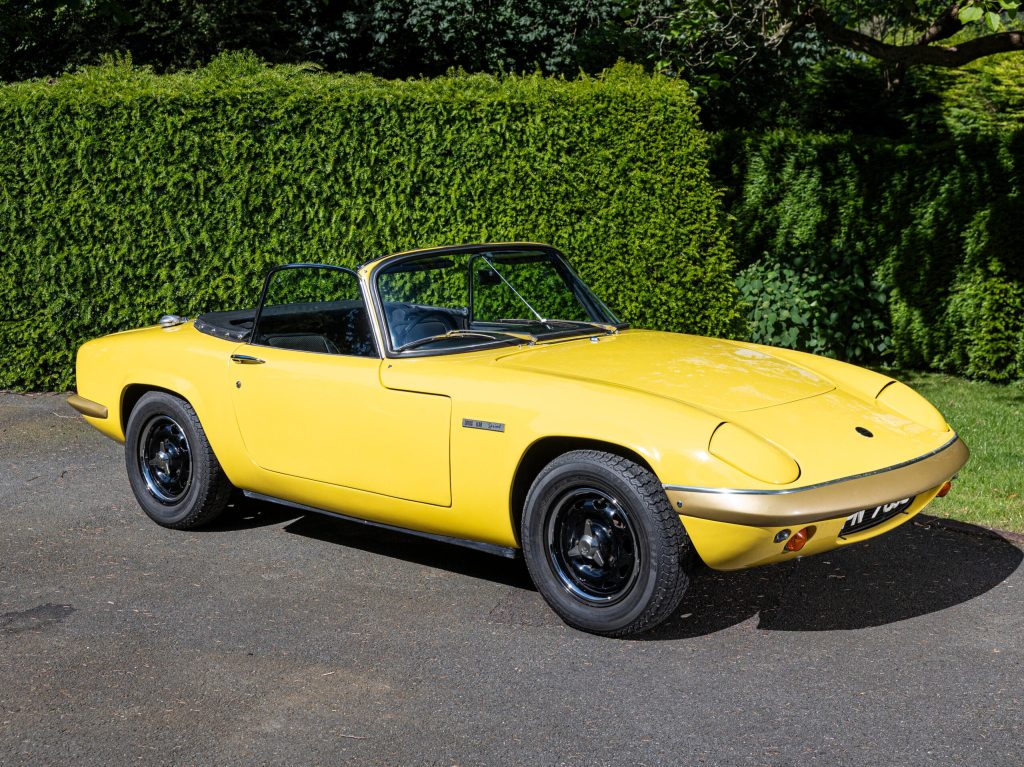
Sold for £19,550
Chassis no. 03019. Yellow with gold bumpers over black. Older restoration, #3+ condition.
Equipment: RHD. 1558cc/152bhp Vegantune inline-4 engine, Spyder replacement chassis, centerlock wheels, power windows, radio.
Condition: Late Sprint model. Comes with a good history file, but little used since acquisition in 2018 and according to Bonhams “would benefit from a shake-down and service before further road use.” Good paint, wheels, and interior.
Bottom line: This little Elan likely doesn’t need much to be a wildly entertaining weekend car, and while a “replacement chassis” sounds like a big red flag, the new galvanised units from Spydercars in the UK offer numerous improvements – some enthusiasts actually prefer and pay a premium for them over the original Lotus backbone. Elans have never been particularly expensive, but this seems like a good buy for a mostly solid car with tasteful upgrades.
Lot 229: 1955 Mercedes-Benz 300SL Gullwing
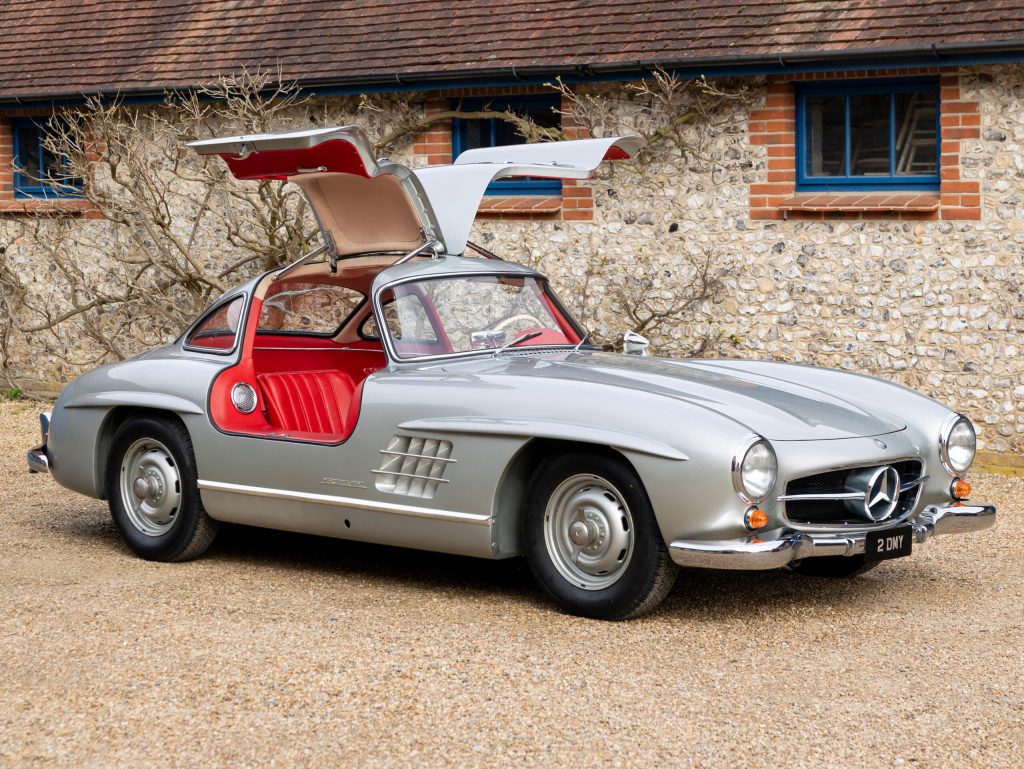
Sold for £1,135,000
Chassis no. 1980405500152; Engine no. 1989805500170. Silver over red leather. Older restoration, #2- condition.
Equipment: LHD. 2996cc/240bhp inline-6, 4-speed, Rudge wheels.
Condition: From the Tom Scott collection. One of 59 delivered new to the UK. Represented as matching numbers. Ordered new with the optional Rudge wheels. Factory-restored from 1989 to ’92 and recently recommissioned by Jim Stokes Workshops. The restoration may be older, but it was of high quality and the car shows few signs of any age or use after 30-plus years of mild driving and careful ownership. It has no apparent needs.
Bottom line: It’s a beautiful Gullwing in classic colours, but this price isn’t anything out of the ordinary, and may be a sign that Gullwing prices are softening.
Lot 245: 1986 Ford Sierra RS Cosworth Group A Rally Car
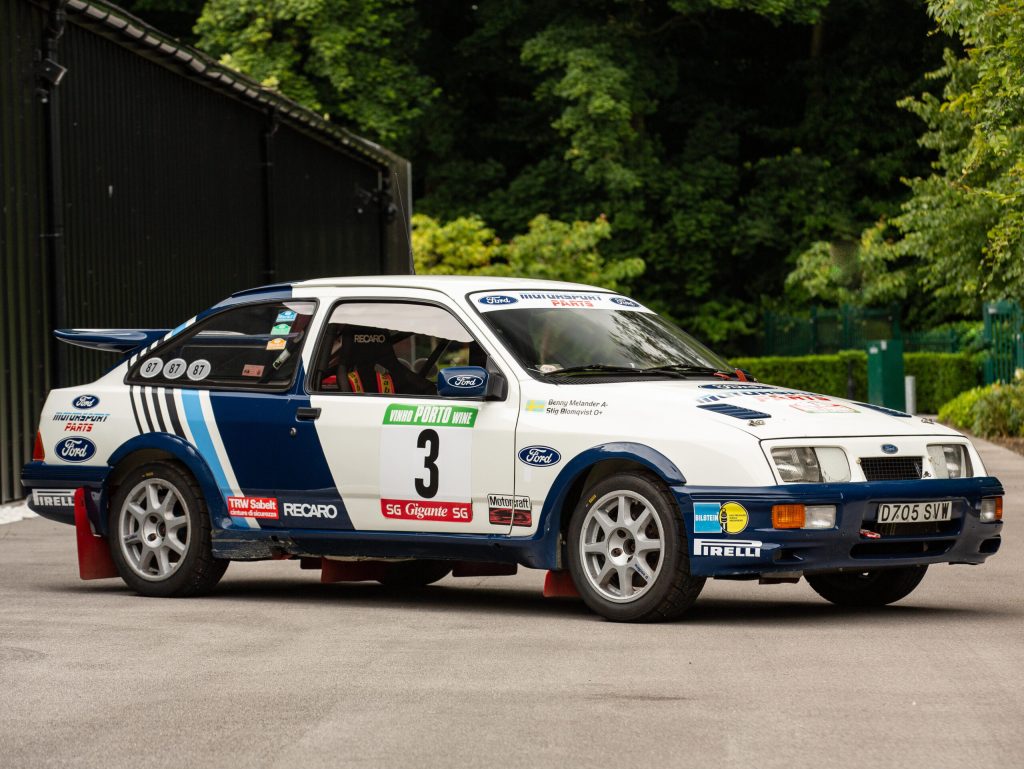
Sold for £165,833
Chassis no. WF0EXXGBBEGR78172. White and blue over black. Competition car, original as-raced, #3 condition.
Equipment: 2.0-litre Cosworth inline-4, BorgWarner T5 5-speed, Recaro seats and harnesses, rally instruments, Speedline wheels. Comes with spare wheels, an ECU, and a light pod.
Condition: Driven in the World Rally Championship by Stig Blomqvist and subequently as a works-backed car by Erwin Doctor. Blomqvist finished fifth at the Rallye de Portugal in the car, and second in the Rally 1000 Miglia. Doctor notched two overall wins, one second- and two third-place results. Represented as the most original surviving Group A Sierra RS Cosworth rally car, and registered for road use in the UK. It has bumps, bruises, and age from use but overall a nice patina that looks appropriate on a historic rally car. It is eligible for all sorts of high-profile and fun driving events, while being registered for road use furthers its desirability.
Bottom line: The Sierra RS Cosworth had its greatest successes in touring car racing, winning races and titles all over the world, but it was a decent rally car as well, first used in the WRC after the FIA banned Group B cars at the end of 1986. Its two-wheel-drive put it at a disadvantage, but one did win the 1988 Corsica Rally outright, and Sierras also won the French Rally Championship and the Spanish Rally Championship. With the growth in popularity of historic rallying, particularly in Europe, this price is strong but unsurprising.
Lot 233: 1937 Morgan 4/4
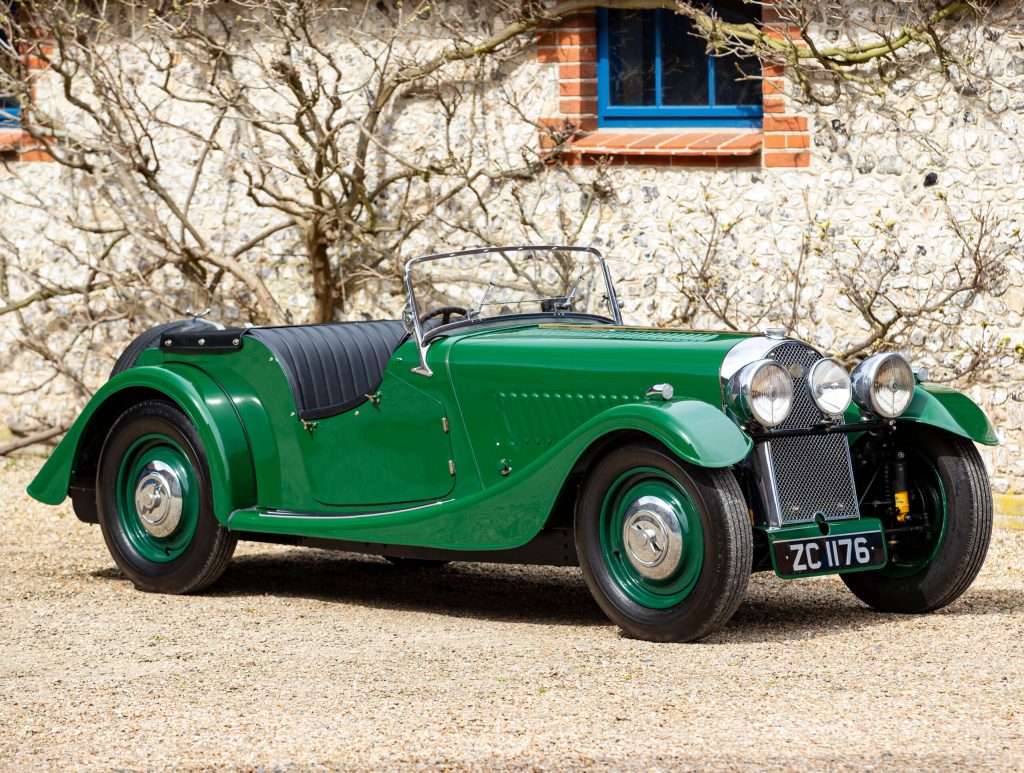
Sold for £28,750
Chassis no. 265. Green over black leather. Older restoration, #2- condition.
Equipment: RHD. 1122cc Coventry Climax inline-4, 4-speed, single driving light, steel wheels with hub caps.
Condition: From the Tom Scott collection. Represented as the first Morgan 4/4 delivered to the Republic of Ireland, and delivered in kit form to avoid import duty. Assembled in Dublin and driven to several race and hill-climb wins in period. Restoration started in the 1990s, paused, then commenced again in 2008. Recent mechanical recommissioning prior to this sale. Showing good paint, clean chassis and suspension, and a tidy engine. Good chrome and trim, and smooth seats. A good showing with only light age.
Bottom line: Built from 1936 to 2018, the 4/4 was the first Morgan automobile with four wheels and the longest-running production vehicle in the world. This is a rare early example that is both well-restored and clean, but it came in under the £35,000 –£45,000 presale estimate. While certainly not the most performance or practicality for the money, it’s still a lot of style, rarity, and fun factor for the price.
Lot 227P: 1928 Mercedes-Benz 36/220 S-Type Four-Seater Sports Tourer
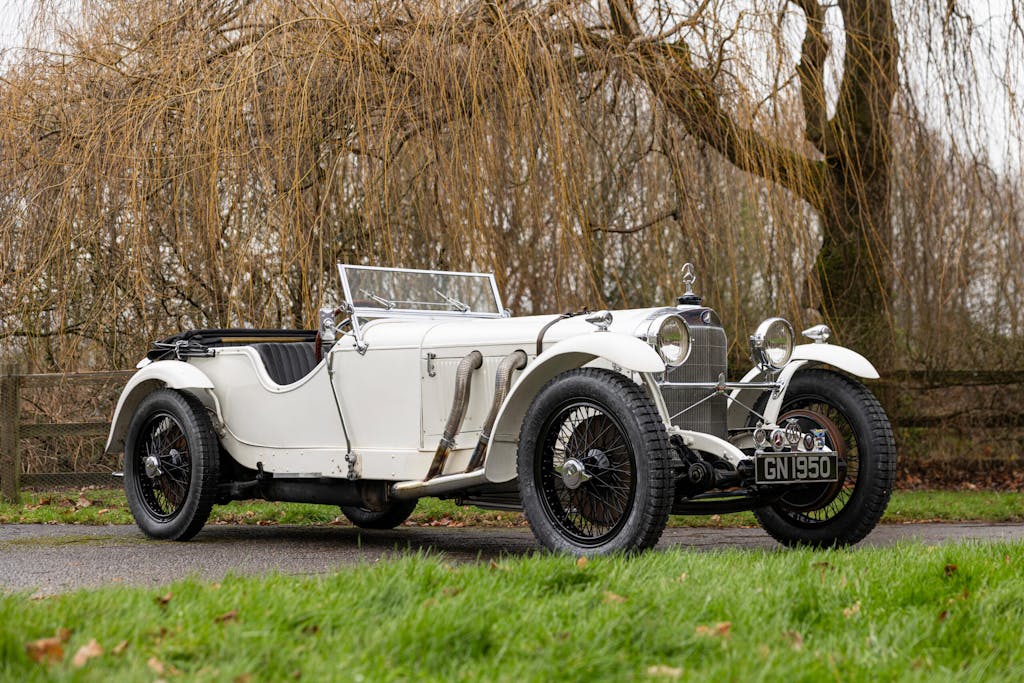
Sold for £2,871,000
Chassis no. 35985; Engine no. 72191. White over black leather. Visually maintained, largely original, #3 condition.
Equipment: 6789cc supercharged inline-6, black wire wheels, wood-rim steering wheel. Coachwork by Sindelfingen.
Condition: From the Tom Scott collection. In the present ownership since 1991 and perhaps the only survivor of its special sporting body. Older paint with a few different shades but that could all polish up. Great wheels and clean suspension. The chassis looks strong and straight. The wonderfully proud radiator grille looks correct and not overly restored. The interior has patina with an untouched looking set of instruments and aged leather. A stellar automobile.
Bottom line: Although the company’s roots go back to the 19th century, and the first Mercedes automobiles date back to the early 1900s, the first “Mercedes-Benz” automobiles didn’t come about until after the merger of Gottlieb Daimler’s and Karl Benz’s companies in June 1926. Ferdinand Porsche served as chief engineer and designed a new model called the “S,” for “Sport.” While a capable, versatile car overall with a low-slung chassis, its party piece was the Roots-type supercharger attached to its 6.7-litre six-cylinder engine. It provided an instantaneous surge of power, from 120 to 180bhp, but only when the driver put the accelerator all the way to the floor. Rudolph Caracciola won the first-ever race at the Nürburgring in 1927 driving a Mercedes-Benz Model S, and the model subsequently racked up wins. Mercedes-Benz followed up with revised, improved models called the SS and SSK.
This one sold new via British Mercedes Ltd. in London to Sir Cecil Harcourt-Smith with a special four-seat sports tourer body by Mercedes-Benz’s own coachbuilders at Sindelfingen. According to Bonhams, the bodywork is “probably unique” in that no other of its exact type is known. Next, it went to John Fitzroy, the ninth Duke of Grafton, who raced it in the 1930s. The Duke subsequently died while racing his Bugatti, and the Mercedes was listed in a 1936 issue of Autocar as “whole chassis recently overhauled and guaranteed 100mph.” Another amateur racer bought it in 1939, and a Mercedes enthusiast bought it in 1946. It sold again in 1960 to a collector named C.W. Peter Hampton. Because of an injury he sustained to his left arm while storming the beaches on D-Day, he reportedly changed the right-hand drive car’s gear change from central to the right side, but otherwise carefully kept and preserved it. Matchbox even chose this very car as the basis for its “Models of Yesteryear” version of the S-Type Mercedes-Benz.
Like the $12.1M 1903 Mercedes Simplex we saw at auction a few months ago, the main appeal and the bulk of the value in this car aren’t derived from nostalgia (although plenty of people probably had the Matchbox version) – rather, they’re in historical significance, rarity, originality, and event eligibility.
Lot 209: 1986 MG Metro 6R4 Group B Rally Car
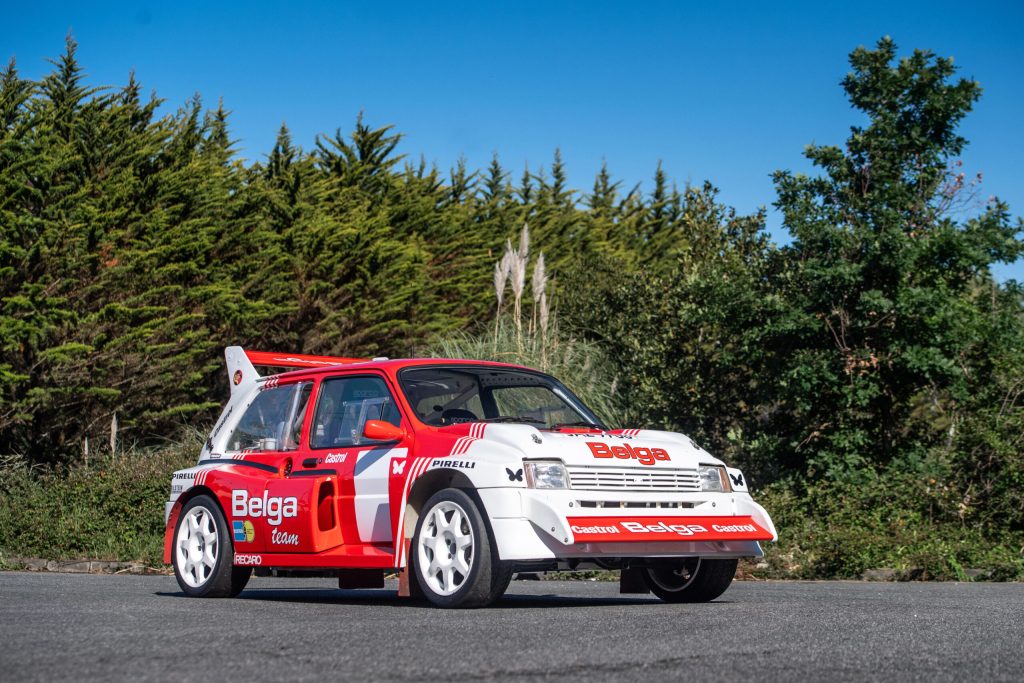
Sold for £80,500
Chassis no. 102/SAXXFXND01AD530771. White and red over black. Older restoration, #2- condition.
Equipment: RHD. 2991cc V6, 5-speed, Sparco bucket seat, roll cage.
Condition: Finished third in its first British rally and competed regularly in period. Used in historic rallies during the 2000s and subsequently overhauled, including a rebody. Further restored in 2020, including an engine rebuild. It’s a very clean car inside and out, though nothing is overdone.
Bottom line: The 4WD, mid-engined MG Metro 6R4 of 1984 (standing for 6-cylinder, Rally, 4-wheel-drive) was Austin Rover’s answer to the highly competitive, big budget, Group B era of the World Rally Championship in the mid-1980s. The basic layout was similar enough to other successful Group B cars, but unlike the other teams that opted for smaller displacement turbocharged and/or supercharged engines, the designers of the Metro 6R4 made the bold but ultimately unsuccessful choice of fitting a naturally aspirated V6. This choice allowed for a larger 3.0-litre displacement in the rules, but the Metro 6R4 was ultimately down on power and only semi-competitive in the WRC. All Group B cars are extreme and amazing machines, however, and they’ve gained notoriety over the past few years that has resulted in higher and higher prices. Sold at no reserve, this one came in way under its £150,000 –£200,000 estimate and is likely the cheapest running and driving Group B car you’re likely to see anywhere.
